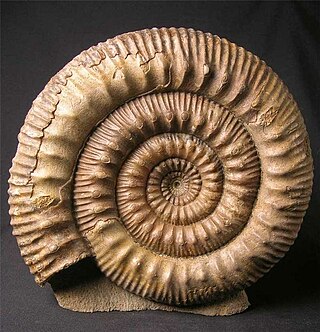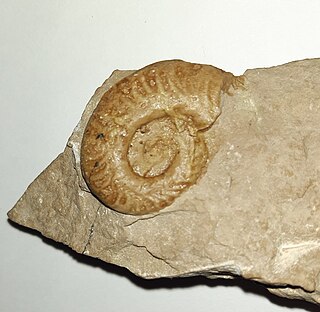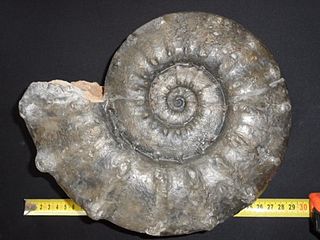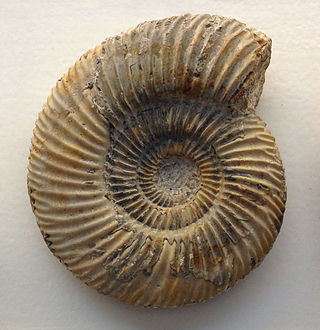
Dactylioceras was a widespread genus of ammonites from the Lower Jurassic period, approximately 180 million years ago (mya).

The Aalenian is a subdivision of the Middle Jurassic Epoch/Series of the geologic timescale that extends from about 174.1 Ma to about 170.3 Ma. It was preceded by the Toarcian and succeeded by the Bajocian.
In the geologic timescale, the Bajocian is an age and stage in the Middle Jurassic. It lasted from approximately 170.3 Ma to around 168.3 Ma. The Bajocian Age succeeds the Aalenian Age and precedes the Bathonian Age.

Stephanoceras is an extinct genus of Stephanoceratoid ammonite which lived during the Bajocian. It is the type genus of the family Stephanoceratidae.
Procerites is an extinct genus from a well-known class of fossil cephalopods, the ammonites. It lived during the Jurassic Period.
Otoites is the type genus of the ammonite family Otoitidae that live during the Middle Jurassic.

Oppelia is a haploceratoid ammonite and type genus for the Oppeliidae that lived during the Middle Jurassic. Shells of Oppelia are involute with a small to moderate size umbilicus, bluntly rounded to sharp venter, and deeply impressed dorsum. Sides are generally smooth but may be variously ribbed on the outer flanks. Similar and related genera include Oxycerites and Oecotraustes.
Okribites is a perisphinctoidean ammonite from the middle Jurassic of the Republic of Georgia. It is assigned to the family Parkinsoniidae, a group of strongly but evenly ribbed evolute, commonly discoidal ammonites. Parkinsonia is a related genus.
Oecoptychius is an extinct genus of fossil ammonite cephalopods. The species lived during the Middle Jurassic.

Hildoceras is a genus of ammonite from the Jurassic period in the family Hildoceratidae. The shells are characterized by a narrow discoidal evolute shape, keeled venter, concave ribs along the outer flanks, and a shallow spiral groove running along smooth inner flanks. Whorls slightly overlap, cross sections are compressed. The ventral keel is bordered on either side by a shallow groove. The genus was named by Alpheus Hyatt after Saint Hilda in 1876.

Psiloceras is an extinct genus of ammonite. Psiloceras is among the earliest known Jurassic ammonites, and the appearance of the earliest Psiloceras species form the definition for the base of the Jurassic. Unlike most earlier ammonites, which had complex shell shapes and ornamentation, Psiloceras had a smooth shell.

The Aspidoceratidae comprise a family of middle and upper Jurassic ammonites that make up part of the superfamily Perisphinctoidea, characterized by evolute shells, commonly stocky, that tend to develop tubercles.

Euaspidoceras is an extinct ammonoid cephalopod genus that lived during the Middle Jurassic.

Pseudopeltoceras is a genus of perisphinctoid ammonites belonging to the family Perisphinctidae.

Parkinsonia is a genus of ammonites belonging to the family Parkinsoniidae.

Cadoceras is an extinct ammonite genus belonging to the Cardioceratidae that lived during the Jurassic period from the late Bajocian to the early Callovian.

Skirroceras macrum is a Stephanoceratacean (ammonite) species belonging to the family Stephanoceratidae.

Euaspidoceras babeanum is an extinct ammonoid-cephalopod species that lived during the Jurassic period.
Reynesocoeloceras is genus of ammonite that lived during the lower Pliensbachian stage of early Jurassic, ammonite zones Ibex—Davoei.
Reynesoceras is genus of ammonites that lived during the upper Pliensbachian stage of early Jurassic. It has evolved from Prodactylioceras, or Cetonoceras. Dactylioceras (Eodactylites) has probably evolved from this genus. Aveyroniceras is a name for macroconchs of this genus. Their fossils were found in Europe, northern Africa, Asia, North America and South America.













